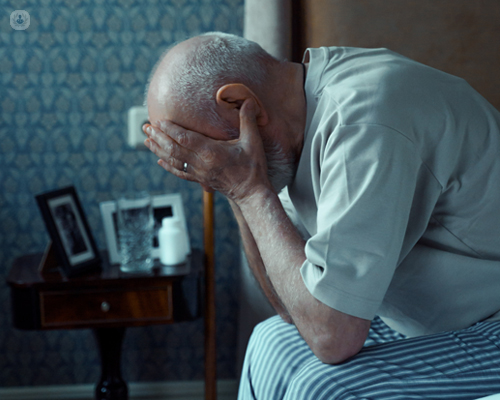Bowel blues: Understanding and managing chronic diarrhoea
Escrito por:Chronic diarrhoea, which refers to diarrhoea that persists for four weeks or more, can significantly impact daily life and overall health. For those suffering from this condition, it’s essential to understand the underlying causes and management strategies to reduce symptoms and maintain quality of life. Here to tell us all about it, is leading consultant general and colorectal surgeon Mr Adrian Fawcett.

What causes chronic diarrhoea?
Chronic diarrhoea can have many causes, ranging from gastrointestinal disorders to infections and food intolerances. Common causes include:
- Irritable bowel syndrome (IBS): One of the most frequent causes, IBS often leads to alternating episodes of diarrhoea and constipation.
- Inflammatory bowel disease (IBD): Conditions such as Crohn’s disease or ulcerative colitis can cause chronic inflammation of the digestive tract, leading to prolonged diarrhoea.
- Infections: Some bacterial or parasitic infections, even after being treated, can result in long-term diarrhoea.
- Coeliac disease: This autoimmune condition is triggered by gluten, causing damage to the small intestine and leading to diarrhoea.
- Medications: Some drugs, such as antibiotics or certain types of chemotherapy, can cause chronic diarrhoea as a side effect.
Managing chronic diarrhoea
Effective management of chronic diarrhoea involves treating the underlying cause, making lifestyle changes, and sometimes using medications to control symptoms.
Here are some strategies that may help:
- Dietary changes: Avoiding foods that irritate the bowel, such as fatty or spicy foods, can help. A low FODMAP diet is often recommended for those with IBS.
- Hydration: Chronic diarrhoea can lead to dehydration, so drinking plenty of fluids, especially those containing electrolytes, is vital.
- Medications: Depending on the cause, medications such as antidiarrheal drugs, probiotics, or treatments for the underlying condition (e.g., immune-suppressing drugs for IBD) may be necessary.
- Stress management: Stress can exacerbate diarrhoea in conditions like IBS, so relaxation techniques, including yoga or mindfulness, can help manage symptoms.
When to see a doctor
If chronic diarrhoea is accompanied by other symptoms, such as weight loss, blood in the stool, or severe abdominal pain, it is essential to seek medical attention. Early diagnosis and treatment can prevent complications and improve the long-term outlook.
Arrange a consultation with Mr Fawcett via his Top Doctors profile.


